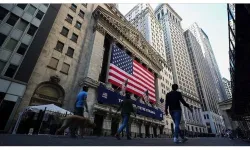Charles Bergh, CEO of Levi's Strauss, the world's largest jeans brand, shared his biggest regret during his tenure in a CNBC report. The famous CEO said that he knew from his second day at the company that the best way to turn the company around was to fire more than half of the executives.
Bergh said, "The easiest way to change the business culture is to change people. I had direct reports from 11 places, and in the first 18 months, nine of them were gone."
But the CEO still said his biggest regret was not firing executives he described as the wrong people fast enough.
"My biggest regret is that we didn't trust the people who could lead well and we lost some of them. Because I held on to one of the executives longer than I should have."
When the CEO joined the company in 2011, it was the worst possible time for Levi's. Consumers were no longer buying Levi's products.
Bersg said, "The brand was really lost. We had a whole generation of consumers in front of us who didn't grow up wearing Levi's the way I did as a kid. The company's performance was really erratic for more than 10 years. One year revenues were up but profits were down. The next year they were turning profits around, but revenues were down," he said.
Six years later, Berch has brought the self-described 'broken' brand back into the limelight. In 2017, Levi's delivered 8% annual revenue growth. That was the highest revenue growth in a decade and well above the 3.1% growth a year earlier. The company continued to grow in 2018, posting 14% year-on-year revenue growth.
Berch is stepping down as CEO next year and said his greatest legacy will be to lead the company out of complacency and build a team that keeps the brand at the center of their culture. "I'm just a conductor and I've built a great team around me," the CEO said.
The company's problems remain
Not everything has been smooth sailing for Levi's under Charles Berch. The company significantly lowered its 2023 profit guidance after reporting a sharp decline in wholesale revenues and soft sales in the US, its largest market. The company expects sales to rise between 1.5% and 2.5% this year. The previous guidance was 1.5% to 3%.
As with many apparel companies, Levi's had to adapt to changing clothing demands, especially as employees returned to offices after the pandemic. People now prefer more comfortable and roomy clothes.
In 2021, Levi's acquired Beyond Yoga to help grow its womenswear business. The CEO said Levi's was aiming for womenswear sales to account for half of the company's total sales.
"It drives me crazy to watch a woman walk into our store, buy our pants, and then walk out and go to an unnamed competitor's store to buy a top," Bergh said.
Levi's women's apparel sales accounted for 35% of the company's net revenues in the first half of the year.
You will be surprised: Levi's CEO reveals his biggest regret
The CEO who saved apparel giant Levi's from extinction and turned it back into a global giant has revealed his biggest regret. Charles Bergh thinks he was too late in firing the wrong people in the company
Trending news

Snoop Dogg to carry the Olympic torch

Lily James Expresses Admiration for Hailey Bieber’s Rhode Skincare Line

Taylor Tomlinson Will Explore Her Faith and Sexuality on Tour!

'Alien mummy' in Peru raises eyebrows

Scandal in the heart of Europe: Child abuse in a church!

Kamala Harris’ Running Mate: Here’s Who Could Be Her VP After Biden Drops Out And Endorses Her









